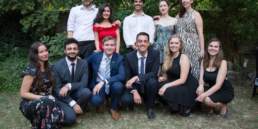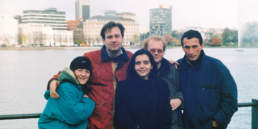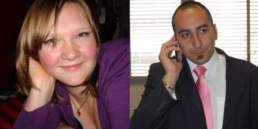From Paris to the Whole of Europe: The Story of AEGEE
The history of AEGEE can be very roughly divided into four different periods:
- In the early AEGEE years (1985-1989) AEGEE was still restricted to European Community members states. It was a period with far less local grups, events and projects than today, but a much bigger political impact.
- In the following five years (1990-1995) AEGEE was embracing Central and Eastern Europe very fast. The network was extending rapidly extending, which changed the character of the association. Also the rapid growth in members due to the success of the Summer Universities made AEGEE bigger and open in character.
- The following five years (1996-2000) saw a strong move towards more professionalism and bigger European projects. This could be seen for example by the move of the headoffice to Brussels with a smaller European board that lived there throughout the year. In addition, with the Network Commission and the AEGEE Academy new bodies were created that helped to develop the network and its human resources.
- Since then (2001 till present) AEGEE has established itself on a high level, supporting the EU Enlargement and democratisation in the East and South-East Europe.
1985-89: The beginning
Birth as EGEE
16 April 1985 is recorded as the birthday of AEGEE. On this day a huge conference was opened in Paris, called “EGEE”, aiming at overcoming the ongoing Eurosclerosis, the paralysis of the European integration process. Under leadership of Franck Biancheri, the five Grand Ecoles in the French capital organised this event, creating a platform for 500 young Europeans from all European Community countries. The conference, which lasted until the 22 April, proved to be very successful and visible under the patronage of François Mitterand, with an official opening ceremony at the Opera Building of Paris and with full page coverage on the well-known French paper Le Monde.
The main striking outcome of this conference was the common statement published in Le Monde : “Eastern Europe is Europe as well”. The name EGEE (Etats Généraux des Etudiants de l’Europe) was related to the Aegean Sea (la Mer Egée) where democracy was created 2,000 years ago. Due to a name collision with a French company, the name was changed to AEGEE in 1988. It is pronounced as if it was a French word “aégée”.
After the organisation of the conference, students involved at that time wanted to carry on with their activities and they decided to turn the EGEE conference into an organization. EGEE wanted to be a platform for young Europeans to discuss the future of Europe, to present their ideas to the officials of the EC institutions and national governments. The participating students also wanted to influence European policy in favour of students. They became enthusiastic and established local branches in their cities, thus creating a network.
Starting in Paris, the association was soon present in Munich, Milan, Leiden, London and Madrid. In 1988, AEGEE was already established in 72 university cities. In this year AEGEE, which was totally focusing on EC member states, opened up to the EFTA countries. An opening to students on the other side of the Iron Curtain was not possible.
Erasmus dinner with Mitterand
In this early period AEGEE’s biggest political success took place – the association successfully lobbied for the implementation of the Erasmus Mobility Scheme after a dinner with Francois Mitterand on 15th March 1987. Impressive was also a satellite link of seven cities in 1986 – which caused bankruptcy for AEGEE-Bruxelles, however. Moreover, AEGEE showed big projects to the outside world: Euromanagers, Europolice, Moot Court, Euro Stage, and the Summer University Project.
Today, nearly all of these initiatives work independently, in their professional demand they grew too strong for a voluntary association. The Summer University Project, introduced in 1988 with 11 courses and now reaching more than 80, still remains part of AEGEE’s activities.
The Agora, which is the democratic AEGEE-Europe general assembly was organised for the first time in Munich, April 1986 creating the structure of the association, composed of the Agora, Presidents’ Meeting (since 2001 Planning Meeting, and since 2005 European Boards Meeting), Comité Directeur and Working Groups. The Network Commission was established only at the Agora in Athens, November 1996.
In 1987 the unofficial board of EGEE came together in Paris on the occasion of a reception at Champs Elysees by Mitterand, where they drafted the first statutes of the association (now known as CIA), they conceptualised the Agora as the General Assembly as well as the European Nights. The Agora in Sevilla in 1987 witnessed the introduction of a chairman at the statutory events, creation of a financial control commission, legal commission now titled as the Juridical Commission, introduction of trans-national regional Antennae meetings later titled as Regional Meetings and since 2006 Network Meetings.
Stagnation and opening towards the East
However, after three years of presidency of Frank Biancheri, a period of stagnation came. The internal trouble started after the short presidency of Vieri Bracco from Milan, who did not complete his task after his election in 1988. In the same year the French locals left AEGEE, forming an own association under the name Artemis. The newly founded French branches could never re-establish in their old strength again.
Europe changed, the Iron Curtain was disappearing, and new perspectives were opened. On the day the Berlin Wall crumbled, on 9th of November 1989, the Agora in Salerno decided to open up to interested students in Central and Eastern Europe. The East-West Working Group started their actions to establish AEGEE locals there – although this was a challenge even for AEGEE network to fully agree and achieve at that time.
(Quoted from the AEGEE Members Manual)
Milestones
1984/1985
-
The event was an iniative of the bureaux des eleves of 5 Grand Ecoles + Sorbonne, who had regular meetings together. Franck Biancheri (president of the science politique one) came with the iniative for a conference for 500 people to discuss European matters. Because the idea was from these grand ecoles it was widely supported. Only a few weeks before the actual forum the idea of continuation popped up. Together with the students who came to the forum the idea was worked out.
-
EGEE I caused a loss of 80,000 ECU for which the organisors stood upright. It was resolved later – the state-owned bank relieved AEGEE from the debts. The interest in politics among the organisers and participants was strong. The believe that France depended on Europe was one of the reasons for the success. During the event there was a big reception in the Elysee (residence of the Frensch president), in the townhall and there was a gala at Chateau Lafitte, the top-winecastle.
-
The event was patronaged by almost all leaders of state of the EC-countries.
-
Paris, Munich, Milan, Leiden, London and Madrid were the six first branches. Strasbourg and Orleans followed. Right from the beginning lot of activities took place.
-
In July 1985 the Statutes of AEGEE-Europe were created.
1986
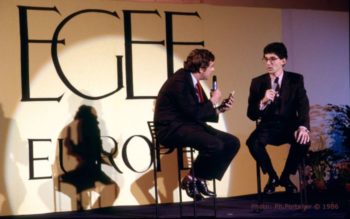
-
Three EGEE working groups were formed: Sponsoring, Traineeships and Language Study.
-
By the start of the academic year, EGEE officially has 26 branches and 6,000 members.
-
“EGEE II – Nuits de l’Europe” took place, a video link between 7 cities all over Europe
-
April: First Agora in München, the structure of the association was adopted, the first CD elected. The structure was promoted mainly by German members, because they thought that that might be more effective. Some AEGEE historians say that almost all changes of structure were either done at German Agoras or initiated by Germans.
1987
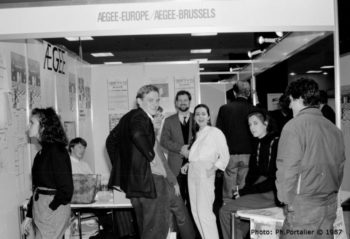
- EGEE persuades French president François Mitterrand to support funding for the Erasmus programme, a student exchange program financed by the European Commission.
-
The network grows to 25 antennae
-
The first News Bulletin is published, AEGEE’s main information tool in the pre-web and pre-mail era. It was first published in Kiel under the name Information Bulletin, before it was renamed by AEGEE-Toulouse, who took it over in December 1987 and handed it over to AEGEE-Amsterdam in 1988. One year later it was taken over by Maria Alvarez in Oviedo: the University of Oviedo paid the biggest part of it. Until 1993 it was made in Oviedo, then in Madrid and afterwards for several years in Warsaw.
- AEGEE launches the magazine Europolis. It was a fancy magazine for the youth of Europe about European topics. AEGEE produced only 6 editions because of the high costs. Until today, the magazine of AEGEE-Athina has the same name.
-
AEGEE starts the project “Euromanagers: European Job Fair”. The purpose was to support recruitment of students by companies. It was the first of its kind. After the first successful years the initiators Christian Hunt & Christophe Leclerq started their own company with it called EMDS. It still exists.
-
The Spring Agora in Leiden was the only Agora ever without elections
-
November Agora Sevilla: Affirmation that AEGEE is political, but not linked to any party, creation of Juridical Commission and Audit Commission.
-
The holiday Apoika took place, the predecessor of AEGEE’s summer universities
1988
- The association changes its name from EGEE to AEGEE following a trademark dispute – check: www.egee.fr.
-
AEGEE planned a Eurovision night: a big show-night which should have been broadcasted all over Europe. It did not take place.
-
Vieri Bracco became second president of AEGEE-Europe and spent several months in Brasil
-
The Summer University project started with 11 events, coordinated by Daisy Kopmels from Amsterdam. She visited all events personally
-
First Presidents Meeting (PM). Its purpose was to prepare the agenda of the Agora
-
Some leading AEGEE members around Franck Biancheri started the political platform “IDE – Initiative for a Democratic Europe”, which ran at the European Parliament election in Germany, France and Netherlands that year. It caused a severe conflict about the involvement of AEGEE into party politics. The result: AEGEE insisted on being politically independent. IDE got 10,000 votes in total.
-
A board of Trustees was introduced to get more continuity in AEGEE-Europe. After some years it was abolished because it did not work out well.
1989
- After the fall of the Berlin Wall, the Agora in Salerno opens up AEGEE to local antennae outside the European Community, making it one of the first European organisations to expand beyond the old Iron Curtain.
- Also Scope was founded: a newspaper for the European youth, freely available all over Europe. However, it was too expensive for AEGEE, therefore it was cancelled.
-
Moot Court is established, a pan-european contest for law students. It left AEGEE and is now co-ordinated by ELSA.
-
Leipzig becomes first contact group beyond the former Iron Curtain. The East-West Working Group starts initiatives.
-
The CD is reduced from 30 to 16 members
(History overview by Edwin Janssen)
[nggallery id=2]
The Event Highlights of 1986 | ||
|---|---|---|
| Month | City | Title |
| January | Brussel (B) | European Student - Utopia or Reality? |
| Leiden (NL) | Industrial Europe | |
| London (UK) | European Space Technology | |
| Paris (F) | European Defence Policy | |
| Milano (I) | European Financial System | |
| München (D) | Integration of South Europe | |
| Nice (F) | Towards a Data Processing Europe | |
| Strasbourg (F) | Media in Europe | |
| March | All over Europe | The European Nights |
| April | München (D) | Agora (EGEE II) |
| July | Madrid (E) | Spain's & Portugal's EU entry |
| October | Nijmegen (NL) | Cross-Borderline Development |
| November | Heidelberg (D) | Europe & Middle East |
The Event Highlights of 1987 | ||
| January | Heidelberg (D) | European Ecology Politics |
| February | Leiden (NL) | Agora (EGEE III - Europe, Unfinished Symphony) |
| March | Amsterdam (NL) | Which Defence for Europe? |
| Delft (NL) | Genetic Engineering in Europe | |
| London (UK) | Air Transport in Europe | |
| Köln (D) | Euromanagers 1987 | |
| Madrid (E) | Mediterranean Environment | |
| Milano (I) | A Technology Strategy for Europe | |
| Nice (F) | Sports in Europe | |
| Paris (F) | Political Marketing in Europe | |
| Lyon (F) | Media in the Membership Countries | |
| April | Athina (GR) | Between Europe & Middle East |
| July | Heidelberg (D) | European Literature |
| August | Madrid (E) | Apoikia Summer Camp |
| September | Delft (NL) | Presidents' Meeting |
| October | Nürnberg (D) | Europe Beyond Reykjavik |
| Hamburg (D) | Completing the Internal Market | |
| November | Louvain-la-Neuve (F) | European Currency Unit |
| Sevilla (E) | Agora | |
| München (D) | European Space Congress | |
| December | Paris (F) | Primer Congress Europe-Afrique |
The Event Highlights of 1988 | ||
| January | Kiel (D) | Multi-Linguality, a problem for Europe |
| February | Brussel (B) | Euromanagers 1988 |
| Louvain-la-Neuve (F) | Presidents' Meeting | |
| March | Lyon (F) | EEC and Eastern Europe |
| London (UK) | European Week 1988 | |
| Strasbourg (F) | Europe - Latin America | |
| April | Milano (I) | Agora |
| Milano (I) | EGEE IV - European Internal Market | |
| May | Mainz (D) | EuroDefence 1988 |
| Reims (F) | Droit Communautaire | |
| June | Berlin (D) | Second European Cultural Week |
| Hamburg&Lübeck (D) | Agricultural Policy | |
| July | Heidelberg (D) | Political & Economic Implications |
| September | Athina (GR) | South Europe Towards 1992 |
| October | Saarbrücken (D) | Presidents' Meeting |
| Aachen (D) | Initiatives for International Education | |
| November | Orleans (F) | Agora |
| Utrecht (NL) | The Aims of Higher Education | |
| Köln (D) | Art Europe | |
| Toulouse (F) | Third European Space Congress | |
| Freiburg (D) | AIDS - Problems in Europe | |
| December | Bonn (D) | European Food Market |
The Event Highlights of 1989 | ||
| January | London (UK) | Human Rights |
| February | Amsterdam (NL) | Envi'rhine'ment |
| March | Lyon (F) | Presidents' Meeting |
| Louvain-la-Neuve (F) | European Week | |
| Leiden (NL) | Terrorism in Europe | |
| April | Berlin (D) | East-West Relations in Europe |
| Madrid (E) | EGEE V - Women in Europe | |
| Salamanca (E) | Agora | |
| Rotterdam (NL) | European Finance | |
| May | Nimes (F) | Road Security |
| München (D) | EEC Development after 1992 | |
| Saarbrücken (D) | Tele-Communicating | |
| June | Heidelberg (D) | Identité Européenne |
| July | Hamburg (D) | EEC-EFTA: Partners in Europe |
| Karlsruhe (D) | New Sports in Europe | |
| September | Amsterdam (NL) | Presidents' Meeting |
| October | Delft (NL) | Transport in Europe |
| Aachen (D) | Working in Europe | |
| Groningen (NL) | Southward Bound Future? | |
| Firenze (I) | Moot Court | |
| November | Salerno (I) | Agora |
| December | Oviedo (E) | Healthy Europe |
| Sevilla (E) | Europe of the Regions |

